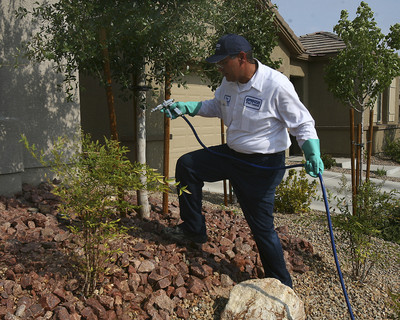Get rid of what bugs you

No one wants to come home at the end of the day to find several thousand ants crawling around the kitchen sink or discover half a dozen roaches gathered near the refrigerator celebrating their discovery of a three-day old piece of French toast. But household pests are a familiar site and they’re not going away.
“The best that can be done to control them is by starting with a clean house,” said Stuart Roberts, general manager of Ambush Pest Control, which has been tracking assorted varmints in the valley since 1991. “Pests need three things: water, food and harborage or a hideout. Eliminate any of those and you have less of a problem. Begin by cleaning your kitchen at night. Put away dishes and don’t leave food out on the table. Plug up holes in the walls and sweep and vacuum the entire house every now and then. It won’t stop the pests, but a clean house isn’t as inviting as one that is unsanitary or unkempt.”
At JS Pest Control, George Botta, operations manager, has some other suggestions for keeping pests at bay.
“Pick up all the fruit that falls from your fruit trees,” he said, “and minimize the amount of bird seed that drops to the ground if you have a bird feeder. Keep shrubs trimmed so they don’t touch your house as sap from bushes attracts insects. Keep all pet food inside the house and even consider pouring that 25-pound bag of dog food you keep in the garage into an aluminum garbage can. Rats and mice can eat through plastic. And drain sitting water as it’s an ideal breeding ground for many pests.”
Newcomers to the valley may notice that pests are not as much of a problem here as they are in other parts of the country. But, when they ask why there are pests in their newly built homes, it does give Roberts pause.
“The valley is growing so fast and we’re building homes and apartments over scorpion and spider nests, disturbing land that has been dormant for decades,” he said. “Those critters aren’t moving into our homes, we’re moving into their homes.”
Be that as it may, Roberts said pests can be controlled.
“The pest control industry is carefully regulated by the government,” he said. “We use a product that is nontoxic to pets and children, doesn’t wash away in the rain, and is approved by the EPA (Environmental Protection Agency). Currently, there is a green movement in the industry for using chemicals made with herbs and plants that are natural enemies to pests that will kill them.”
Roberts explained that roaches die after walking over an area that has been sprayed because the solution enters their bodies via the membranes of their feet. Ants collect deadly pellets and carry them into the colony where they are shared with other ants.
The newest pest keeping both these men busy is the Africanized honey bee, sometime referred to as “killer bees.” Last month, Botta, who has been in the business for 30 years, said his company responded to about 35 bee calls.
“Our bee service is the only one we operate seven days a week,” he said. “That’s how active they are. The Africanized bee is a little smaller than the European bee and they love to build nests in water meter and sprinkler boxes. However, all they really need to start building a hive in your home is a hole no larger than the size of a pencil eraser. These bees pollinate like European bees and do a very good job and basically just want to be left alone. But they’re very protective of their hive and will attack if you get too close or make too much noise.”
If bees, roaches, scorpions, spiders and ants aren’t enough, add bed bugs. Roberts said America eradicated bed bugs back in the ’50s, but that wasn’t true elsewhere in the world.
“Increased international travel has brought the bed bug back to America and Las Vegas,” he said. “They arrive in luggage and spread into hotel rooms and homes. Getting rid of them is a time-consuming and expensive procedure. We had our first call about four years ago and now get about two a month.”
So maybe that little spider on the wall isn’t so bad after all.












